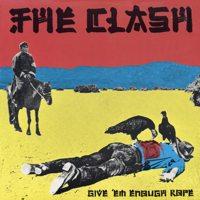
The Clash
Give 'Em Enough Rope (1978)
SumWon
Can Rudie fail? No, no he can't. The Clash made this abundantly clear by incorporating the message into two of their very best songs ("TWO?!?!" cries the casual the Clash fan, "WHAAAAâ¦"). While we're all familiar with "Rudie Can't Fail" from London Calling, there is also a lesser-known Clash song called "Safe European Home" that also brandishes this lyric in an equally epic and climactic sing-along. The song, a rocker with a reggae breakdown, is highly enigmatic. Musically, it seems to suggest that the Clash are growing restless in the safety and non-experimentation of three-chord punk rock, brandishing a relatively unorthodox song structure and an experimental ending complete with a fade-out and a fade-in. Lyrically, on the other hand, it states that they have ventured out into new physical territory (Jamaica) only to hastily retreat back to the safety of the environment they know (Europe). Nice.
Next up is "English Civil War," a dark punk ditty based on the American Civil War tune "When Johnny Comes Marching Home." The song does not carry the same hopeful, optimistic tone as its inspiration, however, as it proclaims that Johnny won't be coming home a winner but with a face "beaten in fear," and that while the sun will be shining upon his return, "you gotta know it's shining through a crack in the clouds." Leaving us hanging on that dubious note, we get to the best track on the album.
RATA-TAT RATA-TAT go the drums as Tommy Gun explodes like a round from a, well, tommy gun I suppose. "Maybe he wants to die for the money, maybe he wants to kill for his country. Whatever he wants, he's gonna get it," goes the refrain, as Strummer warns of the hunger for power that a gun can bestow on its holder. The machine gun-emulating drums carry this tune, a tune so fine it single-handedly merits purchase of this album in my opinion.
Next up is "Julie's in the Drug Squad," a nice little honky tonk-influenced romp about people who sells drugs to rise to the top, only to end up in the slammer. If there is one song that hints at the no-holds-barred experimentation of London Calling, this is the one. With that, the first section of the album comes to a close.
Clearly, the Clash have developed as musicians. With themes and concepts out the wazoo on these first four tracks, the quality was bound to give out a little at some point. Alas, "Last Gang in Town" begins the slide into *gasp* above-average territory -- which is dangerously low for the Clash â with three solid punk rock numbers. "Last Gang in Town," "Guns on the Roof" (borrowing the Who's "Can't Explain" riff for the second time in their career) and "Drug Stabbing Time" continue down the path the beginning of the album laid: a discussion of the perils of gangs ("it's brawn against brain, it's knife against chain"), guns ("guns guns, they're made to shoot"), and drugs ("paying off the big fine, it's drug stabbing time").
We get a change of pace with the next one, "Stay Free," as Mick takes over the mic to sing a love song of two punk rockers making their way through the school system. Musically, this song is a precursor to "Lost in the Supermarket."
The album wraps up with "Cheapstakes" and "All the Young Punks," which share the similar theme of being young and happy with what you have. "We're cheapskates, what are we supposed to do? 'We can rock! We can roll!'" exclaim the boys in the light-hearted "Cheapskates," because after all, you might as well "laugh at your life, there ain't much to cry for." And while you're at it, "live it now, because there aint much to die for," as Joe guides in the album's closer.
Sandwiched between The Clash and London Calling, two of the finest albums in punk (and the latter in all of music), Give âEm Enough Rope does not get the attention it deserves (case in point -- until now, it had not been reviewed here). At the point of this recording, the Clash were a band in transition. The sound on this album is slicker than that of their first, and the non-punk elements pop up sooner rather than later -- and continue to poke their head up consistently through the album (a little honky tonk piano here, a little cowbell there). If you don't have this and you've ever wondered what the hell got into the guys between `77 and `79, you owe it to yourself to pick this up.